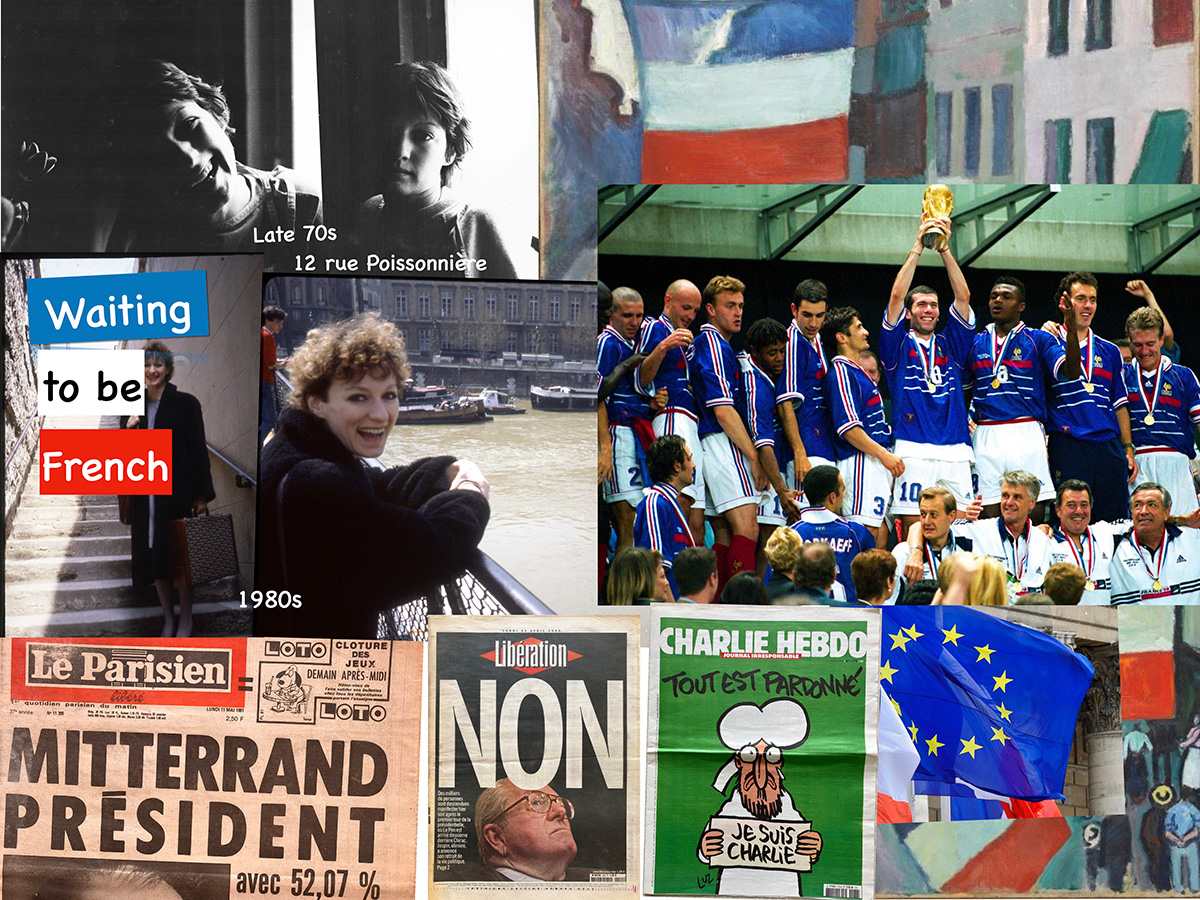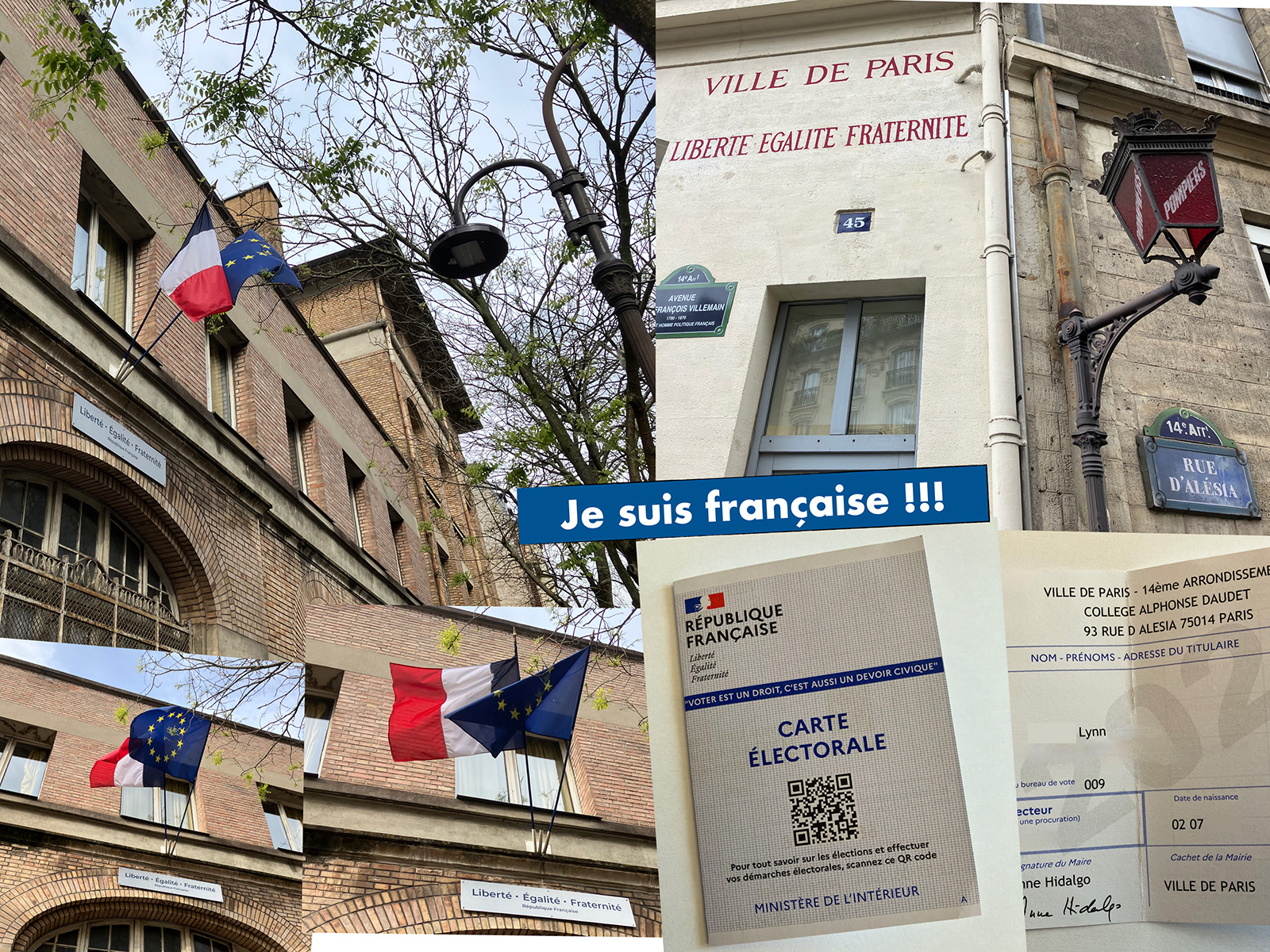Reflections on becoming French on the anniversary of being granted French Nationality.
In 2005 I decided to obtain French nationality. ‘Why?’ friends asked, bemused. After all this before Brexit was even heard of and I had a perfectly good British European passport which allowed me to live and work anywhere in Europe. Why bother with a tedious bureaucratic process? Well, one reason lay in the great American tradition of no taxation without representation. I wanted to be able to vote. I live here, pay taxes here, my daughters are French (even though one was born in Hong Kong), but politically I didn’t exist. Unlike the U.S., Britain, does not grant citizens life-long voting rights (though this is in the process of changing as I write), so I could no longer vote in the UK. And I believe that the right to vote is an inalienable democratic one. Given that the UK recognizes dual nationality, it was win- win for me.

Waiting to be French by Lynn
I must confess there were moments when I considered giving up the whole idea, but I managed to collect and photocopy every official document I had ever received in France, on the tried and tested principle that it’s always the one paper you forgot that proves to be vital. I sent them off and a few months later I was invited to a brief chat with a charming man in a glass booth, which apparently proved that I spoke French. After that, I waited.
Then one day in 2006, a letter arrived informing me that my application for French nationality had been granted on 25 th April and inviting me to a short ceremony on the symbolic date of 14 th July. Of course, there was a hitch. I was originally named after my Polish aunt and I’ve used the Polish spelling on all official documents since my early teens, including in France. But on my birth certificate, the first name is spelt ‘Christine’. This may have been due to my father’s Polish accent and an Ellis Island type of situation. It was quickly turned back to Krystyna on all my British documents, but remained Christine on the certificate itself, so all those years later, that spelling popped up again in my French naturalization papers. I apologize here and now to all Christines. It’s not that I have a particular fondness for the K consonant, but I wouldn’t be me without that final vowel. I could see a bureaucratic battle looming ahead….

Je suis française! by Lynn
I had hoped for a rather grand and moving ceremony, perhaps in the Renaissance revival style Hotel de Ville, with our mayor at the time, Bertrand Delanoë, anointing me or patting me on the back and congratulating me on my citoyenneté. To my disappointment it was held in a rather dilapidated building by the Seine belonging to the Prefecture de Police. We went through airport-type security and climbed up a shabby wooden staircase to a nondescript sort of schoolroom in the attic. There were rows of cheap plastic chairs and a makeshift desk at the front. I admit to a slight pang of guilt when I saw my soon-to-be fellow French nationals. They were from Sub-Saharan Africa, the Maghreb, the Middle East, Asia and South America, and many must have been political or economic refugees. The piece of paper they were about to receive was vital to them, whereas for me it was a luxury. Nevertheless, we were all entitled to it.
The master of ceremonies turned out to be the Director General of the Prefecture who read a fine speech about liberty, equality, and fraternity. He then called us up one-by-one to hand us a folder while simultaneously forcing a smile at a man with a digital camera, and then immediately passing on to the next person. At the back of the room stood a board and trestles with stacks of plastic cups, bottles of water and cartons of orange juice. Not even a drop of wine. Welcome to la République!
My daughters and I skipped the juice and left the building for the nearest café and a glass of Champagne. ‘To democracy,’ I said, raising my glass. We looked inside the folder. There was a copy of the fine speech, information on how to obtain an identity card and a passport, a copy of the 1789 declaration of human rights and the words and music of the Marseillaise (I still can’t get beyond that first couplet…).
The bureaucratic process was not over. In order to vote I needed to sign up at my arrondissement’s town hall and show my ID. But I didn’t want “Christine” on my French ID and I had no idea what I needed to do to change it. And neither did anybody else. It took weeks of phone calls and wandering from office to office in the Prefecture de Police before I learnt that I had to write a former letter to Monsieur le Procureur Général de Nantes. Please, don’t ask me why.
I duly did so, enclosing photocopies of my British passport, my French social security card, my French driving license, French bank account, French pay slips, and everything else I could find proving that I shad always spelt my name with a K, two Ys and a final A. That was at the end of July 2006. By December Monsieur le Procureur had still not replied and the deadline to sign up for a voting card was the 31 st . I decided to take the risk and show up at the town hall with my nationality paper.I had heard that an unprecedented number of people were signing up to vote that year, but I was still surprised by the queue. The vast Salle des Fêtes, which usually holds meetings, exhibitions and concerts, was set up with cubicles along one side and an efficient queuing system on the other where people were pre-processed. Incongruous “easy classical” music was playing very loudly, perhaps to soothe away bureaucracy rage, and I’d heard the full compilation of Strauss Waltzes at least twice by the time I reached stage one. The processing person was dubious but didn’t send me away, which was fortunate for shortly afterwards I found myself in front of a charming young woman (of North African origin), who agreed that she would hate to be forced to change the spelling of her name and had no qualms about signing me up on the electoral roll as Krystyna. If this was the new generation of fonctionnaires, I liked it.
So now I could vote, with a K voting card, but a C passport and ID. Which I did, by bringing along my British passport as well, to show that I was one and the same person. It took precisely 16 years for me to reclaim one K, two Ys and an A. But that’s another story…
Text by Krystyna Horko, an old timer in Paris (since the early 80s). Krystyna is still looking for a new custodian for her mother’s 1955 seventeen volume British Encyclopedia Britannica. © Krystyna Horko, 2023
Collages by Lynn Rovida, another older timer in Paris (since the 70s) who became French finally in 2024.

